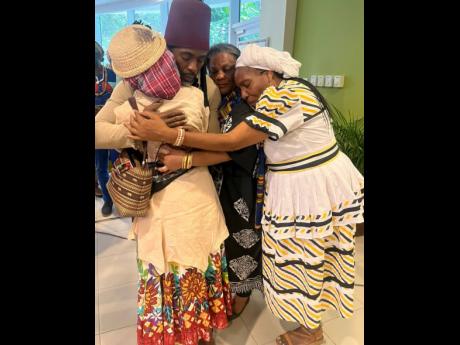Regional indigenous peoples look to head to UN with one voice
Ambassador-at-large for the Garifuna nation in Belize, Cynthia Lubafu Isieni Ellis, is signalling a new renaissance of the indigenous peoples of the Caribbean, who she said have joined together to advocate for international respect and recognition, as well as to address the various issues within their communities.
“We’re not dwelling on the place of our woundedness and our trauma, which is real, but we are finding spaces where we can navigate the landmine, so to speak,” she said.
Ellis was among delegates who visited Jamaica last week to attend a public lecture on indigenous people’s rights. The lecture also featured a special rapporteur on indigenous people’s rights, from the United Nations.
Stating that indigenous people of the Caribbean face “similar issues” of identity and respect, Ellis told The Gleaner that the Caribbean Organisation of Indigenous People has been revitalised to address them.
“We are looking forward to going to the United Nations Permanent Forum on Indigenous Issues again, so that our voices can be heard as a unit ... [on] issues of economic sovereignty, meaning issues relating to land and ownership of land,” she said.
“We were the ones who were declared original takers and custodians of the land, not only land in terms of ownership, but the attitudes of indigenous people towards land as being sacred with our artefacts and our treasures and the resources of the land ... ,” she added.
In December 2021, the Jamaican Government had adopted a policy of non-engagement with the Accompong Maroons of St Elizabeth, instructing ministries, departments, and agencies to not engage with or fund them.
This move stemmed from rhetoric from the enclave’s chief, Richard Currie, who asserted that the Accompong Maroons are sovereign and that it owns the biodiverse Cockpit Country, where the settlement is located.
That rhetoric has bred strife with the Government. Tensions have escalated since Currie sought an order from the Supreme Court in 2022 to declare the Maroons owners of lands in the Cockpit Country.
The Government has since filed an application to have the case thrown out.
But emphasising that she visited all the Maroon communities in Jamaica and did a lot of “listening and sharing”, Ellis said this, also including relating with them the victory of the Q’eqchi and Mopan Maya indigenous communities of southern Belize, which filed a lawsuit against the government for the right to own the land they have occupied for years.
The Caribbean Court of Justice in 2015 ruled that the indigenous people’s ownership of the land was constitutionally protected.
“We tried to explore all avenues and opportunities to see how we could come to an understanding and agreement, that is, a strategy. And then, when all those avenues failed for us, the Mayans took the Belize government to court and we did not get any redress, and so we went to the Caribbean Court of Justice and we won,” she said.
Lauding the resilience of indigenous people, Ellis expressed the view that this trait is inter-generational.
“We as Caribbean people have always resisted. What that means is that, even if we don’t go into a court of law, the resistance and the movement from our spirituality is prime. So, engaging with the colonial structures and the judiciary is one of the strategies of asserting ourselves as a people, so we are very clear in terms of sense of identity,” Ellis told The Gleaner.
She also commended the Garifuna people, who she said have also been resilient and able to command respect, so much so that November 19 is a public holiday to celebrate their contribution to Belize.
“We, as Garifuna, we don’t just declare that we are better than anybody else. We have a concern for our relatives around the world and around the region,” she said. “Maya, Garifuna, we could have never advanced without the support of people from different parts of the region, and also different parts of the world.”

